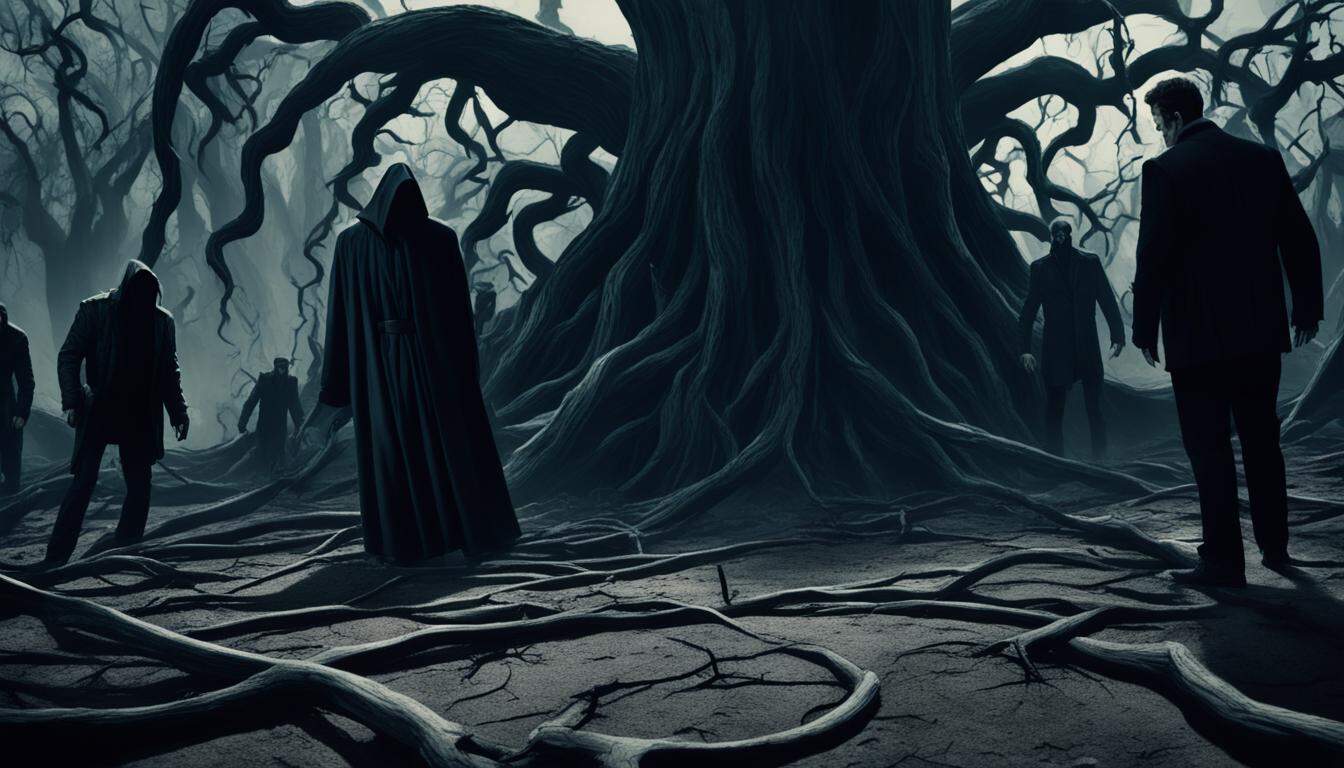Have you ever thought about the rewards for seeing the wicked fall? There’s a promise of justice for those who do evil. Psalm 5 offers comfort. It assures us the wicked will meet their end, bringing rewards we can’t imagine.
The Bible shows us God knows everything and controls all. In Psalm 37, it’s clear the Lord finds the wicked’s plots amusing. So, what’s the impact for us? How does God ensure justice prevails?
Proverbs 11 explains the outcomes of evil. It teaches the righteous are shielded, but the wicked trap themselves. How can we escape evil and feel God’s protection?
Psalm 91 tells of God’s protection. Righteous people don’t face destruction and see the wicked get their due. But how do we choose right over wrong?
Finding joy in others’ misfortunes is wrong, says Proverbs 24. God wants us to be kind, not revel in others’ suffering. How can we balance compassion with a desire for fairness?
Psalm 73 tells of Asaph’s struggle with the prosperity of the wicked. Yet, he realized their fate and his outlook changed. What does his story teach us? And how do we get a divine view on the wicked’s end?
Finally, 2 Thessalonians discusses God’s lasting justice. It says God will punish those who harm us and judge those who reject Him. What’s the lesson for our quest for fairness and goodness?
Join us as we dive into these timeless truths, uncovering divine fairness and the joy in seeing the wicked meet their end.
God’s Awareness and Control: Psalm 37:12-13
In Psalm 37:12-13, it shows God’s justice wins when the wicked harm the good. The verse says how the wicked get angry at the just. But God finds it funny because He knows they will face consequences.
This verse is about God’s complete command over every situation. It comforts the good, telling them they don’t need to fear evil. God sees all and knows the wicked’s plans.
“Though the wicked plot against the righteous
and gnash their teeth at them;
the Lord laughs at the wicked,
for he knows their day is coming.”– Psalm 37:12-13
When we’re up against bad things or unfairness, remember God is in charge. Even if it looks like evil is ahead, their success is brief. God will make everything right in the end.
Believing this brings peace and strength during tough times. We should trust that God’s timing is always right. It’s our job to stay loyal, obey God, and keep doing what’s good.
By choosing to do what’s good, we prepare ourselves for God’s rewards. We can face life’s challenges knowing God sees and will help us.
Key Takeaways:
- Psalm 37:12-13 shows us how God’s justice stands firm in the face of bad things.
- God knows what the wicked plan and do, and He is in complete control of the outcome.
- Putting faith in God’s timing and fairness gives us peace and strength.
- Staying true and good puts us in line with God’s plan and helps us get His blessings.
When life is unfair or evil seems to win, let’s remember God’s fairness always wins. The image below perfectly captures this truth.
The Natural Consequences of Evil Deeds: Proverbs 11:5-8
In Proverbs 11:5-8, meaningful wisdom is shared. It talks about the outcomes of evil deeds and escaping evil with God’s help. It shows how those who act righteously will find their way and how the wicked will fall because of their own actions.
The righteousness of the perfect shall direct his way, But the wicked shall fall by his own wickedness. The righteousness of the upright will deliver them, But the unfaithful will be caught by their own lust. When a wicked man dies, his expectation will perish, And the hope of the unjust perishes. The righteous is delivered from trouble, And it comes to the wicked instead.
This writing speaks of a divine form of justice. It says those who are good find shelter in their righteousness, but the wicked suffer from their own evil. God offers safety from evil to those who do what is right, keeping them safe and away from harm.

Understanding the Natural Order of Justice
Proverbs 11:5-8 tells us our actions have results we can’t avoid. It tells how acting right keeps us safe, unlike the wicked who fall into trouble. This passage reminds us that doing what’s right protects us from the harm that comes to others.
The end for people who do wrong is always bad. Even if they seem to win, it doesn’t last. But those who are loyal to God find true safety and are saved from evil.
The Protective Nature of Righteousness
Choosing to be righteous means we follow God’s way. This choice keeps us from danger. Choosing right keeps us safe and warns us not to turn from what’s good. Seeking righteousness brings us real protection.
The righteousness of the upright will deliver them, But the unfaithful will be caught by their own lust. The righteous is delivered from trouble, And it comes to the wicked instead.
Proverbs 11:5-8 says seeking goodness leads to escaping from trouble. Being faithful to God shields us, turning harm away and toward those who do wrong.
| Consequences of Evil Deeds | Benefits of Righteousness |
|---|---|
| Wicked fall by their own wickedness | Righteous are directed in their ways |
| Unfaithful are caught by their own lust | Righteous are delivered from trouble |
| Expectations of the wicked perish | Hope of the righteous endures |
| Trouble befalls the wicked | Righteous find deliverance |
Considering Proverbs 11:5-8, we learn about the effects of our choices. We should aim for goodness and trust in God’s protection. The fate of the wicked is their own ruin.
The Protective and Just Nature of God: Psalm 91:7-8
Psalm 91 leads us to verses 7 and 8. Here, we see how God’s righteousness triumphs. We learn about the protective and fair nature of God.
The psalmist promises safety for the righteous, even in tough times. They say, “A thousand may fall at your side, and ten thousand at your right hand, but it shall not come near you” (Psalm 91:7). This vivid image shows God’s strong shield of protection.
Even with chaos nearby, the righteous will watch as the wicked face punishment (Psalm 91:8). This shows God’s steady commitment to justice. It paints a clear picture of His fair judgment.
“A thousand may fall at your side, and ten thousand at your right hand, but it shall not come near you” (Psalm 91:7).
These verses bring comfort and hope in an uncertain, unjust world. Righteousness triumphs thanks to God’s fairness and protection. By living righteously, we can trust God to keep us safe. He makes sure justice wins.
The Protective and Just Nature of God in Psalm 91:7-8
| Verse | Description |
|---|---|
| Psalm 91:7 | A thousand may fall at your side, and ten thousand at your right hand, but it shall not come near you. |
| Psalm 91:8 | You will only observe with your eyes, and see the punishment of the wicked. |
Compassion and Righteousness: Proverbs 24:17-18
It’s easy to feel like justice is served when bad people face hard times. But Proverbs 24:17-18 warns us not to celebrate their misfortune. God values kindness and doing what’s right. Cheering at your enemy’s fall can upset Him and change how He treats them.
Justice and compassion go hand in hand. We might want to enjoy our enemies’ suffering. But we’re called to be better, to show care even to those who’ve hurt us. This way, we reflect the love and mercy God shows us.
“Do not rejoice when your enemy falls, and let not your heart be glad when he stumbles, lest the LORD see it and be displeased, and turn away his anger from him.” (Proverbs 24:17-18)
This proverb teaches us God’s justice is fair, not revengeful. He asks us to be kind, even to those who harm us. Enjoying when they fail is not what He means when He talks about loving others like ourselves.
Finding it in us to forgive and show kindness to those who have hurt us is hard but important. Instead of being happy about their issues, let’s work on forgiveness and making things right.
Embracing Compassionate Righteousness
Living with both care and fairness takes effort. We do this by being kind, forgiving, and genuinely caring for others. These things make us act more like Jesus.
When life isn’t fair, we should respond with love and doing what’s right. By being loving and merciful, we help make the world a better place. This is especially needed now.

Striving for a More Compassionate World
Sometimes, our world likes to see others fail. This makes things worse. As Christians, we should stop this by being kind and just.
By uplifting others instead of finding joy in their troubles, we can end the cycle of negativity. We help make the world a kinder place. Love and true justice come from understanding, not from being happy about others’ troubles.
When we face wrongs and difficult people, let’s remember Proverbs 24:17-18. Showing both compassion and fairness helps us follow God’s wishes. This leads to peace and unity.
The Ultimate Fate of the Wicked: Psalm 73:16-19
Asaph, the psalmist, looks at how well the bad people are doing and gets upset. He wonders why they aren’t suffering like they should. But, even with his doubts, Asaph finds peace by God’s side.
Psalm 73:16-19 shows a truth that changes everything. Asaph sees that the wicked’s success is like a dangerous path. It looks strong but leads to their ruin. He then understands his own blessing and God’s guidance.
“When I thought to understand this, it was oppressive to me until I went into the sanctuary of God; then I understood their final destiny. Surely you place them on slippery ground; you cast them down to ruin. How suddenly are they destroyed, completely swept away by terrors!” – Psalm 73:16-19 (NIV)
Asaph learns something big about the wicked’s fate. Their good life is just a front that will fall apart. Even though they seem untroubled, their destruction will come fast.
He realizes how important it is to see things from God’s eyes. We might think it’s not fair how well the bad do. But God shows us their true end through His eyes. This lesson teaches us that God’s fairness is beyond this life.
Like Asaph, we can find peace in knowing the wicked won’t get away with it. God will judge them justly, and their time is up. This is a comfort for us when we see the bad seem to do well.
In a world where the wicked often seem to succeed, our faith in God’s fairness is key. The psalmist’s story tells us the bad might look good for now. But, their end is certain. Living by God’s ways gives us hope in justice, knowing their time will come.

What are the similarities between the rewards mentioned in Psalm 14 and Psalm 5 for recognizing the wicked?
In both Psalm 14 and Psalm 5, the rewards for recognizing the wicked state are described as protection and deliverance from harm. The righteous are promised blessings and the assurance that God hears their prayers and will ultimately uphold justice for those who acknowledge the evil around them.
How Does the Theme of Justice in Psalm 6 Relate to the Fall of the Wicked in Psalm 5?
Psalm 5 highlights the ultimate downfall of the wicked, while Psalm 6 delves into the individual’s cry for mercy, emphasizing divine justice. Together, they portray how God addresses human fallibility and evil. Psalm 6 renewal and restoration reveal the hope for personal redemption after judgment, contrasting with the destruction awaiting the wicked.
The Eternal Perspective of God’s Justice: 2 Thessalonians 1:6-9
Thinking about justice in the world can be complex. 2 Thessalonians 1:6-9 brings an eternal perspective. This view shows God’s righteousness. It says it’s right for God to repay those causing trouble to you.
The text talks about the final judgment. Here, the Lord brings justice to those ignoring God. It promises the bad will get what they deserve, but the good will find peace forever.
Contemplating God’s eternal justice can deepen our understanding. It shows we should rely on God’s fairness. Believing in the final judgment’s rightness is important. Even when evil seems to win now, a just God has the last word.




